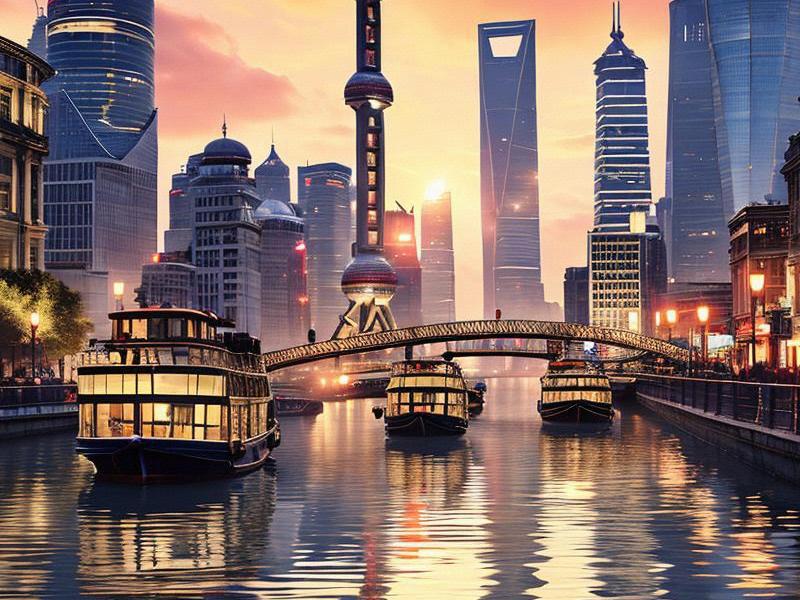This article delves into the multifaceted identity of Shanghai, exploring its transformation from a historic port city to a global hub of innovation, culture, and urban development. Shanghai's unique blend of tradition and modernity makes it a fascinating subject for analysis.

Shanghai, often referred to as the "Pearl of the Orient," stands as a beacon of China's economic and cultural prowess on the global stage. This vibrant metropolis, with its stunning skyline and rich history, has undergone a remarkable transformation over the past century, evolving from a modest fishing village into one of the world's most dynamic cities.
The journey of Shanghai is a testament to the power of urbanization and globalization. In the late 19th and early 20th centuries, Shanghai was forcibly opened to foreign trade by Western powers, leading to the establishment of the International Settlement and the French Concession. These areas became melting pots of cultures, where Chinese traditions coexisted with European, American, and Japanese influences. The iconic Bund, with its colonial-era architecture, stands as a reminder of this era of cosmopolitanism.
However, the true renaissance of Shanghai began in the late 20th century, following China's economic reforms and opening up. The city has since become a symbol of China's rapid economic growth and modernization. The Pudong New Area, once a rural hinterland, has been transformed into a futuristic financial district, home to the world's tallest skyscrapers, including the iconic Oriental Pearl Tower and the Shanghai Tower.
Shanghai's economic success is not limited to its financial sector. The city is also a global leader in trade, manufacturing, and technology. Its well-developed infrastructure, including the world's busiest container port and a highly efficient metro system, facilitates seamless connectivity both domestically and internationally. Shanghai's role as a gateway to China has made it a key player in global commerce, attracting multinational corporations and fostering innovation.
爱上海论坛 Culturally, Shanghai is a vibrant tapestry of tradition and modernity. The city boasts a rich heritage of art, literature, and cuisine. The former French Concession, now a trendy area filled with boutique shops, art galleries, and cafes, offers a glimpse into the city's colonial past. Meanwhile, the Yu Garden and the nearby Yuyuan Bazaar provide a taste of traditional Chinese culture, with their intricate carvings, classical architecture, and local delicacies.
Shanghai's cultural scene is further enriched by its numerous museums, theaters, and music venues. The Shanghai Museum, renowned for its extensive collection of ancient Chinese art, attracts millions of visitors each year. The city's theaters host a wide range of performances, from traditional Chinese opera to contemporary plays and concerts. The annual Shanghai International Film Festival is a major event that showcases the latest works from around the world.
Education is another area where Shanghai excels. The city is home to some of China's top universities, including Fudan University and Tongji University, which attract students from across the globe. These institutions are at the forefront of research and innovation, contributing to Shanghai's reputation as a knowledge-based economy.
Sustainability is a growing concern for Shanghai, as it continues to expand and modernize. The city has implemented various initiatives to promote green development and reduce environmental impact. The construction of eco-friendly buildings, the expansion of public transportation, and the promotion of renewable energy sources are all part of Shanghai's commitment to sustainability.
上海龙凤论坛419
One of the most ambitious projects in this regard is the Shanghai Green Belt, a large-scale urban forest that aims to improve air quality and provide a habitat for wildlife. The city has also invested heavily in public transportation, with plans to expand the metro network and introduce more electric buses. These efforts reflect Shanghai's dedication to creating a livable and sustainable urban environment.
Despite its rapid development, Shanghai remains deeply rooted in its history and culture. The city's preservation of historical sites and its celebration of traditional festivals demonstrate its commitment to maintaining its unique identity. The Mid-Autumn Festival, with its mooncakes and lanterns, and the Spring Festival, with its dragon dances and red envelopes, are just a few examples of how Shanghai honors its cultural heritage.
Shanghai's international profile continues to grow, with the city hosting numerous global events and conferences. The Shanghai World Expo in 2010 was a landmark event that showcased the city's ability to organize large-scale international gatherings. The Expo attracted millions of visitors and highlighted Shanghai's role as a global hub for innovation and culture.
上海私人品茶 In conclusion, Shanghai is a city of contrasts and complexities, where the old and the new coexist in harmony. Its journey from a small fishing village to a global metropolis is a story of resilience, adaptability, and ambition. As Shanghai continues to evolve, it remains a symbol of China's progress and a source of inspiration for cities around the world.
The future of Shanghai holds even greater promise, as the city looks to further enhance its global status. With ongoing investments in technology, education, and sustainability, Shanghai is poised to remain at the forefront of urban development. The city's ability to balance economic growth with cultural preservation and environmental responsibility will be key to its continued success.
As Shanghai continues to grow and innovate, it will undoubtedly face new challenges and opportunities. The city's leadership must navigate these complexities with foresight and wisdom, ensuring that Shanghai remains a vibrant and inclusive metropolis. By embracing its rich history and cultural heritage while embracing the future, Shanghai can continue to shine as a beacon of progress and a model for sustainable urban development.
In the ever-changing landscape of global cities, Shanghai stands out as a unique example of how tradition and modernity can coexist and thrive. Its story is a testament to the human spirit's capacity for innovation and adaptation. As we look to the future, Shanghai's journey serves as an inspiration for cities worldwide, demonstrating the possibilities of a harmonious blend of the old and the new.